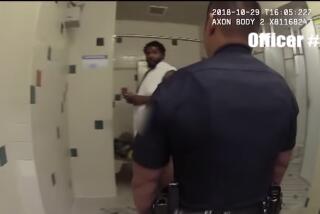Dentist Loses Appeal in Murder Conviction
- Share via
SAN FRANCISCO — The state Supreme Court, acting in a widely noted case, has refused to hear the appeal of a Costa Mesa dentist convicted of murder in the deaths of three patients from the misuse of anesthesia at his clinic.
Dr. Tony Protopappas was found guilty in 1984 of three counts of second-degree murder in what was believed to be the first murder conviction of a dentist in the United States for the death of a patient.
Because of attention given to the case, new supervisory and training requirements were instituted in the state and more than 140 dentists lost the right to administer general anesthesia. Protopappas, 41, is in Soledad Prison serving a 15-year term.
Ruling Causes Confusion
In a brief order issued Thursday, the justices returned the case to the state Court of Appeal in Santa Ana, which had upheld Protopappas’ conviction, and told the panel to refile its opinion after the high court has disposed of another case raising similar legal issues.
The order caused some confusion among attorneys in the case, but it appeared that the court had merely chosen a relatively unusual procedure to effectively uphold Protopappas’ conviction.
State Assistant Atty. Gen. Janelle B. Davis said Friday that the Court of Appeal would reaffirm its previous decision with only minor changes in its first opinion. “I don’t see how the result can be anything different,” she said.
Protopappas’ court-appointed attorney, Handy Horiye of San Diego, agreed that a reaffirmation of the conviction was “one of the possibilities” that could result from what he described as a “very unusual” order by the high court.
Horiye added, however, that he might make another attempt to reverse the dentist’s conviction before the Santa Ana panel.
Prosecutors in the case justified murder charges against Protopappas on the ground that he knowingly endangered the three victims by administering overly large doses of anesthesia and then failing to care for them properly.
When the case first came to the Court of Appeal, Horiye argued that the dentist would not have risked his successful practice by knowingly jeopardizing the lives of his patients--and thus should have been convicted of no more than involuntary manslaughter.
The attorney contended that legal instructions given to the jury did not make it clear that in order to return a verdict of second-degree murder, jurors must find that Protopappas acted with “implied malice,” meaning he understood that his procedures were life threatening.
The Court of Appeal, in a ruling issued June 2, agreed that the instructions were ambiguous but said that any uncertainty had been removed by the prosecutor, who told jurors that it was necessary to find that the dentist knew that his actions threatened patients’ lives. Under these circumstances, any error in the jury instructions was “harmless,” the panel said.
Expected to Act Soon
“No reasonable person, much less a dentist trained in the use of anesthesia, could have failed to appreciate the grave risk of death posed by the procedures he utilized,” Appellate Justice Edward J. Wallin wrote for a unanimous three-member court.
In its order, the Supreme Court told the Court of Appeal to refile its opinion after completion of its case “People vs. Guzman,” which the justices are expected to act upon soon.
In that case, another appellate panel found that instructions given jurors on “implied malice” were improper. But in that instance, the panel said, the prosecutor sought to exploit, rather than clarify, the ambiguity in the instructions.
As a result, the defendant’s conviction must be overturned, the court said.
More to Read
Sign up for Essential California
The most important California stories and recommendations in your inbox every morning.
You may occasionally receive promotional content from the Los Angeles Times.
![Vista, California-Apri 2, 2025-Hours after undergoing dental surgery a 9-year-old girl was found unresponsive in her home, officials are investigating what caused her death. On March 18, Silvanna Moreno was placed under anesthesia for a dental surgery at Dreamtime Dentistry, a dental facility that "strive[s] to be the premier office for sedation dentistry in Vitsa, CA. (Google Maps)](https://ca-times.brightspotcdn.com/dims4/default/8c153ef/2147483647/strip/true/crop/2010x1344+32+0/resize/320x214!/quality/75/?url=https%3A%2F%2Fcalifornia-times-brightspot.s3.amazonaws.com%2F78%2Ffd%2F9bbf9b62489fa209f9c67df2e472%2Fla-me-dreamtime-dentist-01.jpg)












